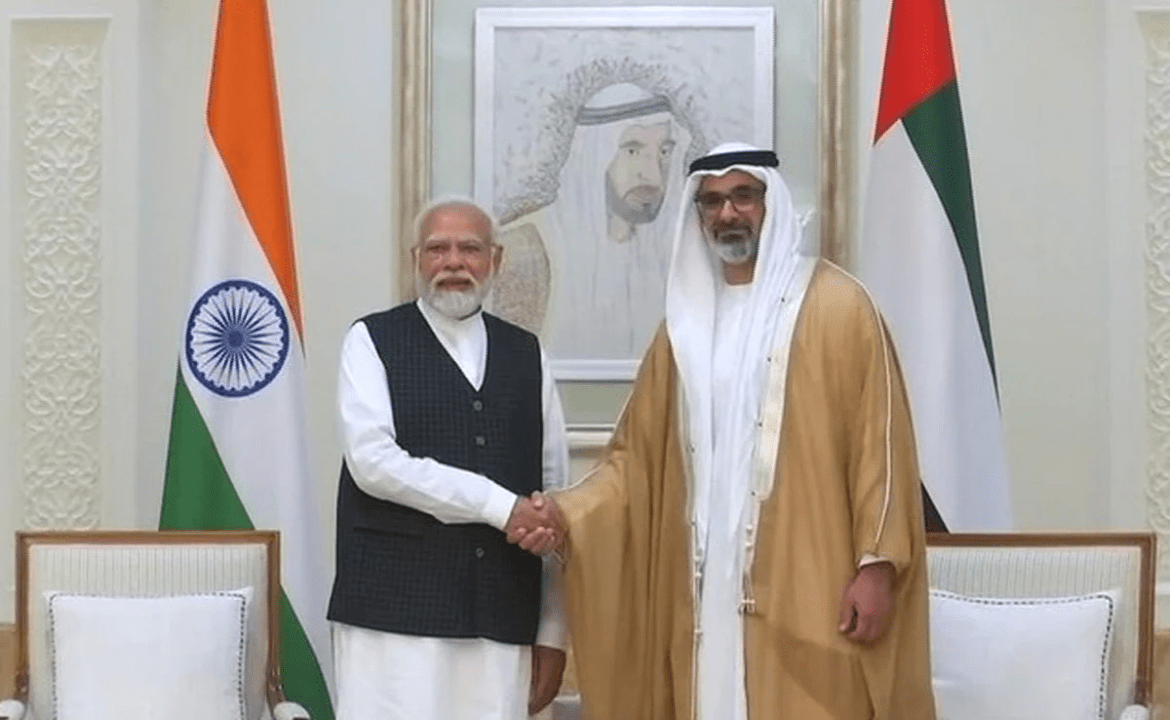AI Generated Summary
- The signing of three agreements to promote cross-border trade using local currencies, enhance payment and messaging systems, and establish an IIT-Delhi campus in Abu Dhabi signifies a significant step towards deeper economic collaboration between India and the UAE.
- Three Memorandums of Understanding (MoUs) were signed to facilitate the use of local currencies for cross-border transactions, establish a connection between payment and messaging systems, and set up an Indian Institute of Technology (IIT) campus in Abu Dhabi.
- Sultan Al Jaber, CEO of ADNOC and concurrently the president-designate of CoP28, separately met with Prime Minister Modi and briefed him on the UAE’s approach to the upcoming important meeting.
In a significant development, India and the United Arab Emirates (UAE) have embarked on a path to strengthen their economic and diplomatic relations. A series of agreements were reached on Saturday, aimed at fostering cross-border transactions using local currencies, integrating payment and messaging systems, augmenting India’s strategic crude reserves with more oil from the UAE, and finalizing plans for food corridor projects within India.
With an eye on a trade milestone, the current bilateral trade volume of $85 billion is expected to reach $100 billion in the near future. Three Memorandums of Understanding (MoUs) were signed to facilitate the use of local currencies for cross-border transactions, establish a connection between payment and messaging systems, and set up an Indian Institute of Technology (IIT) campus in Abu Dhabi. These MoUs were signed in the presence of Prime Minister Narendra Modi and UAE President Sheikh Mohamed bin Zayed Al Nahyan, following productive discussions between the two leaders.
A warm reception awaited Prime Minister Modi as he was greeted by Crown Prince of Abu Dhabi, Khaled bin Mohamed bin Zayed Al Nahyan, at the airport. Notably, the Prime Minister was honored with the UAE’s highest award, the Order of Zayed Award, in 2019.
The talks between Prime Minister Modi and Sheikh Mohamed also delved into strengthening defense exchanges, sharing experiences, and capacity-building. The joint statement released after the talks emphasized bilateral cooperation in the fight against terrorism, terrorist financing, and extremism.
Food security emerged as a key focus area, with both nations expressing their commitment to enhancing the reliability and resilience of food supply chains. They also aimed to expand food and agriculture trade, particularly through the implementation of food corridor projects in India.
In a display of mutual trust, the Abu Dhabi National Oil Company (ADNOC) currently stores crude oil in two of India’s strategic reserves, which it is permitted to export. As part of increased investments across the entire energy spectrum, the joint statement confirmed that the amount of oil stored would be further augmented. Sultan Al Jaber, CEO of ADNOC and concurrently the president-designate of CoP28, separately met with Prime Minister Modi and briefed him on the UAE’s approach to the upcoming important meeting.
The signing of three agreements to promote cross-border trade using local currencies, enhance payment and messaging systems, and establish an IIT-Delhi campus in Abu Dhabi signifies a significant step towards deeper economic collaboration between India and the UAE. Furthermore, the focus on bolstering food security and expanding food and agriculture trade underscores the determination of both nations to ensure the reliability of their food supply chains.
The strengthening of ties between India and the UAE holds great promise for mutual growth and prosperity, while also paving the way for increased cooperation in various other domains, including defense, counter-terrorism, and energy. As the two nations forge ahead, their partnership is set to leave a lasting impact on the region and beyond.




